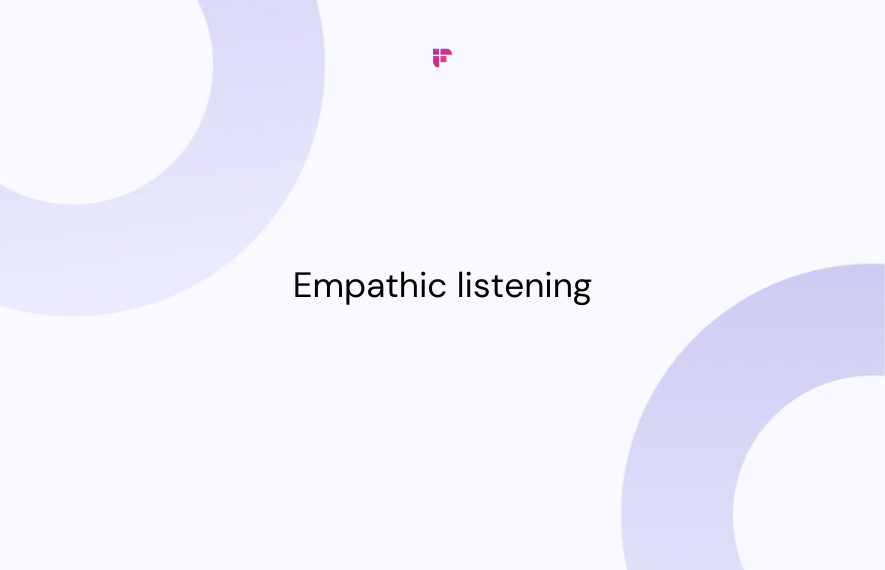Effective communication is a cornerstone of healthy relationships, personal or professional. One key aspect often overlooked in conversations is empathic listening—the ability to understand and connect with others on a deeper level.
In this blog post, we'll explore what empathic listening is and provide 11 top techniques that will help you cultivate this essential skill.
Plus, you'll discover how Fireflies.ai is a must-have tool on your journey to empathetic listening.

Empathetic listening is a communication skill that involves fully focusing on and understanding another person's perspective, feelings, and experiences without judgment.
Being an empathetic listener means creating a supportive space for the speaker to express themselves.
This allows you to build trust, foster open communication, and strengthen interpersonal relationships.
With that being said, here are 11 must-try empathetic listening techniques:
1. Ask open-ended questions
Encourage the speaker to share more by asking open-ended questions. These questions prompt detailed responses and show that you are genuinely interested in their thoughts and feelings.

Avoid yes-or-no questions, as they tend to limit the depth of the conversation. An example of an open-ended question is, "What aspects of this situation are most important to you?"
2. Empathize without offering solutions
Sometimes, when someone shares their struggles or concerns, our natural inclination is to provide immediate solutions.
However, if you want to be a better listener, you need to resist this urge. Instead, focus on empathizing with the speaker's emotions without rushing to offer fixes.
For example, if a friend expresses frustration about a challenging situation at work, instead of providing solutions, you can empathize by saying, "I can imagine how tough that must be for you. It sounds like you're dealing with a lot right now."
3. Listen patiently
Empathetic listening begins with a commitment to patiently hear what the other person has to say, even if their perspective differs from yours.
It involves actively demonstrating acceptance through non-verbal cues like nodding or using phrases such as "I understand" or "I see."

Also, you should resist the impulse to interrupt, even if you're eager to share your own experiences. Instead, let the speaker express themselves fully and take the time they need to articulate their thoughts and emotions.
4. Be present
To be a good listener, you need to be fully present in the moment and provide your undivided attention.
To achieve this, eliminate distractions by creating a conducive environment for communication. For example, you can put away your phone, close your laptop, and turn off notifications.
Other ways to show to demonstrate your attentiveness include:
- Maintaining eye contact
- Keeping your posture relaxed and open, e.g., avoid crossing your arms
- Leaning forward
- Nodding
- Using verbal affirmations such as "right" or "uh huh."
5. Pay attention to non-verbal cues
Non-verbal cues often convey more than words alone. So, when practicing empathic listening, pay close attention to the speaker's body language, facial expressions, and tone of voice.
These cues may offer valuable insights into unspoken emotions or reservations, providing a better understanding of the speaker's state of mind.
6. Embrace silence
Silence can be a powerful tool in communication. Resist the urge to fill pauses; instead, allow the person speaking to express themselves at their own pace.
Silence can indicate various things, such as the individual contemplating their thoughts or managing emotions during the conversation.
7. Repeat statements as questions

To delve deeper into the speaker's thoughts, employ the technique of repeating their statements as questions.
This subtle encouragement often prompts individuals to provide additional details or insights.
For instance, if the speaker says, "I'm just feeling really overwhelmed with this project," you can probe further by replying, "You say you're feeling overwhelmed with the project?"
8. Be honest when asked questions
When the speaker asks for your input, you need to be honest with them. However, you should be careful not to influence their thoughts or hinder further communication.
Striking a balance between honesty and sensitivity contributes to a trusting and open dialogue.
9. Don't judge
Avoid being judgmental by setting aside personal opinions and biases when listening to the speaker's thoughts and opinions.
This is why it's crucial to maintain an open mind throughout the conversation. If you find yourself reacting to something, acknowledge these reactions and make a conscious effort to let them go.

The goal is to be fully present for the other person, recognizing the validity of their experience, even if it differs from your own.
10. Assure the speaker of confidentiality
Maintaining confidentiality is another crucial element of empathetic listening. Assuring the speaker that their disclosures will remain private will help build trust and encourage the speaker to share more freely.Related: The Ultimate Guide to Zoom Security Features & Settings: 7 Steps to Protect Your Meetings
11. Remember to follow-up
After the initial conversation, check in with the person to see if they have additional questions or comments.If necessary, you can arrange for another meeting time. This follow-up reinforces your ongoing support and commitment to understanding their perspective.
Strengthen your empathetic listening skills using Fireflies.ai
.png)
Fireflies is an AI-powered meeting tool that can help you improve your empathetic listening skills with its advanced transcription and note-taking capabilities.
Let's check out how Fireflies can help you listen more empathetically.
1. Accurate meeting transcriptions
Fireflies.ai automatically records, transcribes, and summarizes all your meetings/calls across various platforms, including Google Meet, Zoom, Teams, Webex, and more.
It captures all valuable conversations and stores them in a centralized location to make them more accessible.
Now, you can actively engage in conversations during meetings, knowing that Fireflies is effectively handling the documentation of all discussions.
By storing all your meetings, Fireflies allows you to revisit and reflect on the nuances of each discussion easily. This way, you can gain a deeper understanding of others' perspectives and identify how to improve your communication style.
2. Smart Search
With its Smart Search filter, Fireflies lets you quickly review your calls and retrieve key information in minutes. You can search for dates, times, metrics, questions, and more.
This allows you to grasp any underlying messages in your conversations and make sure that you don't miss any crucial details.
3. Conversation Intelligence
Fireflies also lets you extract key meeting insights with its Conversation Intelligence feature. You can track topics and access metrics like speaker talk time, words spoken per minute, talk-to-listen ratio, sentiment, monologues, etc.
The talk-to-listen ratio is particularly important, as it shows you the ratio of time you talked vs. time you listened during your meetings. This metric will empower you to identify areas for improvement, ensuring a more balanced and empathetic approach to conversations.
💡 Boost your listening skills and build more meaningful relationships with Fireflies
Be present in conversations, avoid distractions, capture key meeting discussions, and elevate your listening game.
The takeaway
Cultivating empathic listening is an ongoing process that requires conscious effort and practice.
As you strive to become an empathetic listener, remember that it's not merely about hearing words; it's about understanding emotions, perspectives, and experiences.
By implementing these 11 techniques into your daily interactions and leveraging Fireflies' conversation intelligence tools, you'll be well on your way to improving your communication skills!





